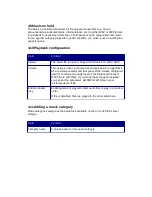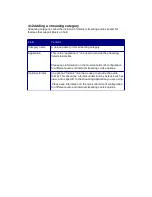
4.15Parking Lot
Callers can be placed in a parking with a time out associated, after which the caller is
transferred to the specified destination. This allows receptionist, for example, to place
a caller on hold while waiting for their desired extension to become available. The
caller in the parking lot would then, after the parked timeout, automatically ring
reception again, by which time the desired extension might have freed up.
Field
Content
Enable
When enabled, calls can be parked using the parking lot.
Extension
The extension to transfer calls to in order to park them. The
default is *70. When in an active call, dial a transfer feature
code (e.g. ##) and this extension. If the call has been
successfully parked, the id of the parking bay for the call will be
announced. This id is based on the extension configured here
(e.g. 71, 72, etc.) To pick up a parked call, dial the parking bay
id, e.g. dial 71.
Number of slots
The number of call parking bays for calls. If there are no
available call parking bays,
Timeout
The timeout before the parked call attempts to connect to the
original destination again, if not answered in the interim.
Context
The call context of parked calls. This should remain the default
funless requested otherwise for test purposes by Far South
Networks.
Alert-info
This field allows custom Alert-info to be sent in the SIP header
when this call is transferred to the destination specified for
orphaned parked calls. This allows enabled phones to ring
differently and inform the recipient of the call that this call is an
orphaned parked call.
CallerID prepend
This field allows a custom value to be prepended to the call's
caller id when this call is transferred to the destination specified
for orphaned parked calls. This allows the recipient of the call to
see that this call is an orphaned parked call.
Announcement
If specified, this audio file is played to the user on hold in the
parked call before transferring the call to the orphaned parked
call destination.
Destination for
orphaned parked
calls
A parked call that has become orphaned is transferred to this
destination. A call becomes orphaned when it has exited
parking by re-attempting the original destination, and the
original destination does not pick up the call or transfer the call
to another destination (e.g. voicemail).
















































